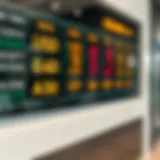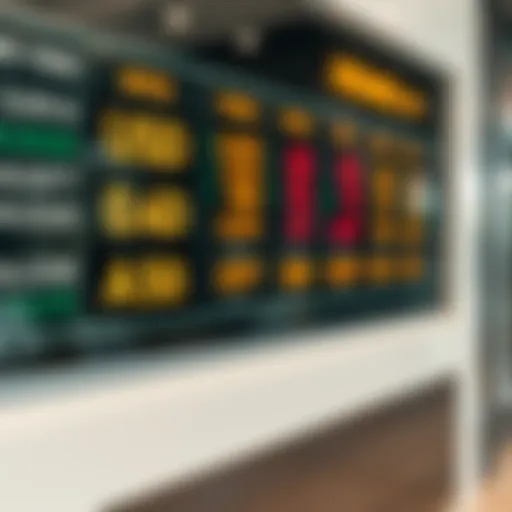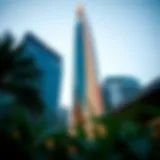Exploring Ramadan's Impact on Dubai's Vibrant Culture
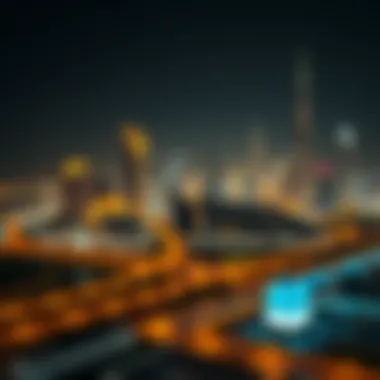

Intro
Ramadan transforms Dubai into a vibrant tapestry of culture and tradition, juxtaposed with its modern skyline and bustling lifestyle. The holy month brings about a significant shift, not just in daily routines but also in the economic landscape of the city. The atmosphere becomes thick with anticipation as individuals and communities prepare for a time of reflection, fasting, and communal unity. In this transformative period, various sectors—from real estate to hospitality—embark on unique adaptations that reflect both respect for traditional values and the city’s aspiration towards progress.
In this piece, we will delve deeper into the pulse of Dubai during Ramadan, examining how key market segments endure changes that resonate with its cultural heart. We will uncover how the real estate market responds to increased demand for communal living spaces, the hospitality sector thrives with special iftar offerings, and how community engagement and events flourish amid fasting.
Market Trends
Current Market Analysis
As we step into Ramadan, the dynamics in Dubai's real estate landscape exhibit notable variance. Increased disposable income and a focus on community living push demand beyond the typical target segments.
Market analysts note:
- Rising Interest in Family-Friendly Neighborhoods: There’s a considerable surge in interest for homes in areas like Jumeirah Village Circle and Dubai Marina, which offer excellent amenities and communal spaces during Ramadan.
- Rental Market Stability: Even amidst fluctuating property prices, rental rates show resilience, primarily due to expatriate populations looking for temporary accommodations.
Furthermore, the period creates an uptick in short-term leasing as families seek to capitalize on the festive mood by hosting gatherings and iftar celebrations.
Future Projections
The trajectory for the post-Ramadan market appears optimistic. Analysts predict:
- Continued Growth in Community Developments: As Dubai expands, the focus will likely remain on creating integrated communities where social interactions are not just encouraged but designed into the living experience.
- Increased Investment Opportunities in the Hospitality Sector: With hotels ramping up their offerings and revamping spaces for Ramadan themed events, investors should keep a sharp eye on emerging trends and collaborations within the hospitality framework.
Property Insights
Neighborhood Comparisons
Diving deeper into specific neighborhoods, each offers its uniqueness during Ramadan, contributing to the larger narrative:
- Downtown Dubai: Central to Ramadan activities, this area hosts grand iftar events and cultural celebrations, drawing both residents and tourists.
- Al Quoz: Known for its artistic vibe, this neighborhood sees an influx of those looking to blend spirituality with creative expression through art events and community festivities.
This diversity in neighborhoods not only influences social interactions but shapes the investment potential as well.
Property Types Explained
When it comes to property types frequented during Ramadan, the landscape varies:
- Villas and Townhouses: Ideal for families wanting space for communal gatherings, properties in areas like Arabian Ranches resonate well.
- Apartments: Compact and convenient for individuals, apartments in Downtown and Dubai Marina become hotspots for hosting festive events.
The Significance of Ramadan in Dubai
The observance of Ramadan in Dubai holds a multifaceted significance that extends beyond mere fasting. This month is not just a time for restraint; it shapes the cultural, social, and economic landscape of the emirate. Understanding this significance is crucial for anyone involved in the various sectors impacted by these traditions, from real estate to hospitality. It provides insights into consumer behavior, fosters community spirit, and evokes a profound appreciation for the rich tapestry of Emirati life.
Cultural Importance
The cultural landscape of Dubai flourishes during Ramadan. Though the city is known for its modern infrastructure and fast-paced lifestyle, the holy month brings a sense of unity among the diverse population. Traditional practices come to the forefront, creating a vibrant mosaic of activities and gatherings.
The significance lies not just in the act of fasting but also in how it influences daily routines and interactions. Families and friends gather for Iftar to break their fast, sharing traditional dishes such as dates, lentil soup, and Arabic coffee. This exchange fosters a deeper connection among residents and encourages inclusivity.
People from various backgrounds partake in cultural activities. Many establishments, especially local markets, revamp their offerings to reflect the spirit of Ramadan. Such celebrations display the rich traditions unique to the region, stimulating both local and tourist interests. Attention turns to the intricacies of Arabic calligraphy, poetry, and storytelling, enriching the cultural fabric as everyone resonates with shared values and experiences.
Religious Practices
Within the heart of Ramadan lies significant religious observance, influencing both public and private lives. The fast extends beyond abstaining from food and drink; it encourages spiritual reflection, prayer, and self-discipline. Businesses often adjust their operations in recognition of these practices. Many open later in the day and close early, acknowledging the communal focus on prayer and the need for spiritual engagement.
Daily prayers, especially the Taraweeh prayers held at night, become a staple in many families’ routines. These gatherings are not just for worship; they often become community events, drawing individuals from all walks of life together in worship.
The call to prayer resonates deeply, interrupting the busy urban rhythm of Dubai. Establishments often showcase signs like "Iftar Timing" to mark the time for breaking fast, emphasizing communal observance. The sense of peace and spirituality envelops the city, granting a unique rhythm to everyday life that attracts both locals and expatriates alike.
Community Spirit
Ramadan is synonymous with community and togetherness in Dubai. It prompts a surge in charitable activities, with many individuals and organizations initiating fundraising campaigns and community support initiatives. Various local and foreign entities offer meals to those less fortunate, ensuring that no one breaks their fast alone.
The community spirit shines brighter during Ramadan, as people come together for joint Iftars, bridging gaps between cultures and religions. Mosques often host community meals that welcome one and all, encouraging a melting pot of experiences. This mutual interaction contributes to a shared identity that resonates throughout the city.
"Ramadan is not just a month of fasting; it is a time to connect, reflect, and uplift one another within the community."
In essence, Ramadan is more than a religious observance in Dubai; it is a time that encapsulates culture, faith, and togetherness, reinforcing existing bonds while fostering new connections across a myriad of backgrounds.
Real Estate Trends During Ramadan
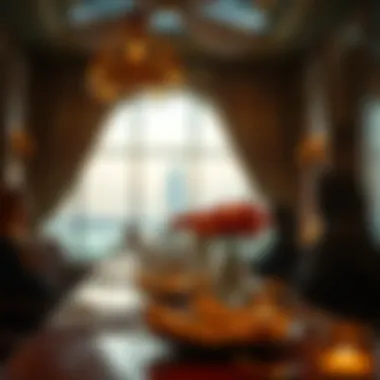

The real estate sector in Dubai experiences notable fluctuations during Ramadan, reflecting both the spiritual context of the month and practical adjustments made by residents and investors alike. As the city embraces a time of fasting, reflection, and community, the real estate trends during this period shift significantly—shaping demand, influencing investment strategies, and altering market behaviors.
Market Behavior
Ramadan presents a unique rhythm in the Dubai real estate market. Traditionally, the months leading up to this holy period see a spike in residential leasing as families prepare for gatherings and special celebrations— this increases the demand for larger living spaces that can accommodate family and friends. Property agents often report a drop in viewings during Ramadan itself, with many potential buyers and renters postponing their decisions until after Eid.
However, it’s essential to look beyond the surface. Despite a slowdown in leasing activity, property owners may use creative means to attract tenants. Many landlords offer flexible payment plans or incentives such as a month of rent-free living following Ramadan.
Purchasing high-end luxury properties might also see a surge, as affluent investors are often on the lookout for opportunities that align with the festive season, wanting to take advantage of favorable prices before the market picks up again post-Ramadan. This nuanced behavior leads to a unique opportunity for both buyers and agents to engage meaningfully.
"The essence of Ramadan encourages mindfulness and patience; qualities that shine through in real estate negotiations and transactions during this time."
Investment Opportunities
Ramadan also acts as a catalyst for investments in specific types of properties, particularly in areas located near mosques or cultural hubs. As the community swells during Iftar and community gatherings, properties in these locales can see an uptick in interest. Investors might consider:
- Short-term rentals: With visitors traveling for Ramadan festivities, properties available for short-term stays become particularly enticing.
- Commercial spaces: Businesses looking to capitalize on the increased foot traffic during Ramadan may seek locations that can support temporary installations or pop-up shops.
- Family-oriented developments: Suburbs or areas that offer family amenities become attractive for investors aiming to meet the demands of growing communities.
It’s crucial to stay informed about market trends, as the investment landscape adjusts dynamically. Agents specializing in Ramadan real estate strategies may offer valuable insights into the best practices for navigating this month. Accessing market data from local websites such as Dubai Land Department can provide up-to-date information on property values and trends.
In summary, the real estate landscape in Dubai during Ramadan is marked by shifts in behavior and opportunity, urging investors to adapt strategies accordingly. Recognizing these patterns can greatly enhance investment outcomes and pave the way for informed decisions both during and after this significant month.
Hospitality Sector Adjustments
The hospitality sector in Dubai transforms in remarkable ways during Ramadan, reflecting both the sacred nature of the month and the desires of a diverse clientele. With a fluctuating tourism landscape and cultural demands, hotel owners and restaurateurs find themselves navigating a tightrope of expectation and innovation. This adjustment is not merely about maintaining business but rather serving a community that holds dear the values of festivity, reflection, and sharing.
Iftar and Suhour Offerings
One of the most anticipated aspects of Ramadan in Dubai is the culinary offerings that grace tables during Iftar and Suhour. Iftar, the meal to break fast, showcases a resplendent array of traditional dishes, usually enjoyed with family and friends. You might find dates and coffee as a simple yet powerful beginning. Following this round is often a smorgasbord of Middle Eastern delights like harees or biryani, intertwined with modern twists from various global cuisines.
Many hotels and restaurants roll out specialized iftar buffets that can be truly extravagant. For instance, at the iconic Burj Al Arab, one can relish a multi-course iftar prepared by world-renowned chefs, featuring succulent lamb, fragrant rice, and pastries that melt in your mouth.
- Why this matters:
- Guests seek not just a meal but an experience.
- Culinary offerings create a fusion of tradition and modernity, captivating even the most discerning palates.
- Competitive pricing during Ramadan attracts a larger crowd, ensuring that restaurants remain vibrant hubs of activity.
Suhour, the pre-dawn meal, is also notably significant. Many eateries extend their hours to cater to this late-night crowd, offering lighter fare that still maintains cultural significance. Think foul medames and labneh alongside creative nocturnal drinks that energize diners for the day ahead. The right offerings here can decide whether a restaurant thrives or barely makes it through the month.
Ramadan Promotions
Another strategic element in hospitality adjustments during Ramadan is the prevalence of tailored promotions and packages. Dubai's hotels often employ a mix of incentives to attract both local and international visitors.
- Discounted Room Rates:
Many hotels, like the Atlantis, The Palm, introduce special rates reminiscent of their lavish services while being accessible enough for guests looking to celebrate with family and friends. - Iftar and Suhour Packages:
Comprehensive iftar and suhour deals are now widely marketed, combining both meals at a reduced price, which encourages families looking to celebrate together to choose the same venue for both experiences. - Cultural Events:
Hotels may also host events such as storytelling sessions or traditional music evenings to enrich the ambience, connecting guests with local customs while promoting their services.
Offerings like these are vital because they boost occupancy rates during a time known for slowing down tourist arrivals. Well-executed promotions cultivate goodwill and memory, making guests more likely to return even after Ramadan.
In summary, the hospitality sector's responses to the specific cultural and social dynamism of Ramadan in Dubai not only signify an understanding of market trends but also demonstrate a commitment to preserving and celebrating rich traditions.
Overall, adjustments in the hospitality realm shape a vibrant tapestry of experiences that respect the spiritual essence of Ramadan while ensuring business longevity. They remind us that this holy month is more than just fasting; it offers a chance for deeper connections and culinary explorations.
Festivals and Events
In Dubai, festivals and events during Ramadan bring the community together in a unique way, fostering a sense of belonging and celebration amidst the solemnity of the month. The blend of modernity and tradition creates vibrant experiences that resonate with both locals and visitors. These gatherings act not just as entertainment, but as vital cultural touchstones, encouraging reflection, dialogue, and shared experiences. Such dynamics make Ramadan an exquisite time in the Emirate, highlighting the intricate interplay between spirituality and communal joy.
Ramadan Markets
Ramadan markets, or "Souqs", pop up across the city, turning into bustling epicenters of activity. Characterized by a kaleidoscope of colors and scents, these markets offer an array of traditional items, local crafts, and tantalizing foods.
These markets are more than mere shopping venues; they embody the spirit of Ramadan. Visitors can sample dates stuffed with nuts, savor delicious samosas, or sip on refreshing lemon mint drink. Local artisans showcase their craftsmanship through handmade products, while vendors become storytellers, engaging with customers and sharing the significance of their goods.
A few prominent markets include:
- Ramadan Night Market: Known for its vibrant atmosphere, this market often runs for the entire month, attracting large crowds who come to shop, eat, and celebrate.
- Al Seef Bazaar: Situated along Dubai Creek, this market offers a mix of cultural performances and shopping in a picturesque setting.
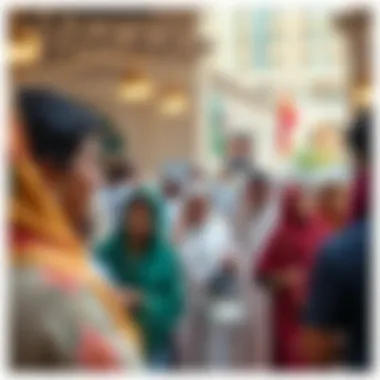

The benefits of engaging in these markets include not only the opportunity to purchase unique items but also to connect with the cultural fabric of Dubai. Importantly, these markets emphasize sustainability through supporting local economies and trade.
Cultural Events
Cultural events throughout Ramadan further enhance the experience by merging education with entertainment. Various organizations and community centers host workshops, lectures, and artistic performances focused on the rich Islamic traditions. Noteworthy events include:
- Iftar gatherings: Many hotels and community centers organize communal iftar dinners, bringing together people from various backgrounds. Sharing a meal after a day of fasting encourages unity and understanding.
- Art exhibitions: Local galleries might feature works that reflect themes of Ramadan, providing both reflection and insight into the cultural landscape of the UAE.
- Musical performances: Traditional music often fills the air, enhancing the festive atmosphere.
These events encapsulate the essence of Ramadan, offering opportunities for learning and engaging beyond the physical observances of the month. Participation cultivates greater appreciation for the values surrounding this holy period, bridging gaps between diverse cultures and elevating the experience of all participants.
"Ramadan isn’t just a time of fasting, but also a time to reflect on our actions and connect with our communities."
Community Engagement Initiatives
During Ramadan, community engagement in Dubai takes on a heightened significance, embodying the essence of togetherness, charity, and social responsibility. These initiatives provide an avenue for individuals and groups to come together, creating a sense of belonging while supporting the values of empathy and compassion, which are central to this holy month.
Importance of Community Engagement Initiatives
Community engagement initiatives during Ramadan stretch far beyond the act of giving; they foster a deeper connection among residents. Such activities focus not just on addressing immediate needs but also on weaving a fabric of support that runs through the community. Ramadan's environment encourages altruism, prompting individuals and organizations to channel their efforts towards improving lives and uplifting the less fortunate. When the sun sets, breaking the fast becomes more than a meal; it transforms into a gathering that helps bridge divides among various cultural and social backgrounds.
Charitable Activities
Charitable activities stand as a cornerstone of community engagement during Ramadan. Many organizations in Dubai rally to support those in need, from food drives to fundraising events. It's common to see groups organizing Iftar meals for the homeless or families who struggle to make ends meet. These initiatives are not merely acts of charity; they represent a broader commitment to fostering a spirit of humanity.
- Food Distribution: Various nonprofits operate food banks and meal distribution beyond iftar. Enlightening partnerships with local supermarkets help create a supply and logistics network that maximizes resources.
- Fundraising Campaigns: Many organizations launch campaigns to gather funds for an array of causes, benefitting sectors such as healthcare, education, and social services.
- Awareness Programs: Charities often include workshops or information sessions, illustrating the impact of charitable work in the community and encouraging others to participate.
"Acts of charity during Ramadan are like the stars in the sky—each one lights up the darkness, illuminating paths for others."
Volunteer Opportunities
Volunteering during Ramadan not only enhances community welfare but also provides participants with profound personal growth. Numerous opportunities arise during this month, allowing individuals to dedicate time and talents for a cause they are passionate about. Each effort contributes to a larger mosaic essential in creating a sustainable community.
- Helping Hand Initiatives: Many organizations continually seek volunteers for their feeding programs, where individuals can sign up to help prepare and serve meals. This hands-on experience ensures that volunteers witness the real impact they are making.
- Community Clean-Up Drives: As Ramadan encourages mindfulness, it often comes with awareness of the environment. Engaging in clean-up drives promotes not just communal harmony but also lifestyle changes toward sustainability.
- Mentorship Programs: Some initiatives connect volunteers with underprivileged youth, providing guidance and mentorship that extend beyond Ramadan. This reflects a commitment to long-term change within communities, demonstrating the power of connection in nurturing future generations.
Challenges Faced by Residents
Understanding the challenges confronted by residents during Ramadan in Dubai offers a deeper glimpse into the fabric of this vibrant city. As the month unfolds in bright lights and spiritual reflections, it brings about a series of adjustments that affect daily life. Individuals and families must navigate these shifts carefully, affecting both their lifestyle and work environments.
Lifestyle Adjustments
The month of Ramadan necessitates significant lifestyle shifts for many, as the daily rhythm alters in line with fasting practices. One of the main adjustments involves meal timings. Residents often find themselves aligning their eating and sleeping schedules with the pre-dawn suhour and post-sunset iftar meals. This can lead to a disruption in daily routines, such as grocery shopping and social engagements. Grocery stores, particularly, transform into hubs during the evening hours as families stock up for iftar.
Additionally, staying hydrated throughout the non-fasting hours becomes an essential consideration. As temperatures can soar and the days grow long, individuals aim to sip water and replenish their bodies without overindulgence when breaking their fast, which may complicate hydration management. For instance:
- Focus on hydration: Planning fluid intake and avoiding caffeinated drinks is a must.
- Meal preparations: Residents begin to embrace batch cooking and meal planning.
- Cultural adaptiveness: Evening activities are centered around the community, fostering communal bonds but requiring flexibility in social schedules.
"During Ramadan, every family member contributes to preparing meals, creating both challenges and cherished moments in the kitchen."
Workplace Dynamics
In professional settings, the season of fasting introduces adjustments in workplace dynamics that can’t be overlooked. Companies often modify working hours to accommodate the fasting schedule, which can lead to a shift in productivity and employee engagement levels. Typically, reduced working hours are observed, and it’s not unusual for businesses to halt operations early—just after lunch, in fact.
This can have both positive and negative implications. On one hand, the shortened workday allows employees to return home early to prepare for their iftar meals. On the other hand, collaboration may become more challenging, especially in team-oriented environments where energy levels during the fasting hours vary widely.
- Flexibility in work hours: Many organizations embrace staggered schedules, tailoring hours to respect the spirit of Ramadan while maintaining output.
- Employee support programs: Some firms introduce wellbeing initiatives, offering relaxation spaces within office environments.
- Cultural sensitivity: Businesses may prioritize understanding the significance of Ramadan, focusing on team bonding through community service or charitable projects during the month.
The assessment of these lifestyle adjustments and workplace dynamics provides a lens through which to view the intricacies of living in Dubai during Ramadan—a time when self-reflection coexists with the demands of modern living.
The Role of Technology During Ramadan
In today's fast-paced world, technology acts as a vital lifeline, particularly during transformative times like Ramadan. Dubai, with its unique blend of tradition and modernity, exemplifies how tech can enrich religious observances while facilitating daily life amid the holy month. The intersection of culture and innovation paints a vivid picture of how advancements are being embraced, reshaping both personal and communal experiences.
Mobile Applications
Mobile apps have nearly taken over our daily routines. They especially shine during Ramadan, providing invaluable support to the fasting community. For instance, there are many apps designed to help Muslims track prayer times, read the Quran, and find the nearest mosques. One such example is Muslim Pro, a widely used application that offers users the ability to listen to Quranic recitations and access prayer times tailored to their specific location, whether they’re in the heart of Dubai or traveling abroad.
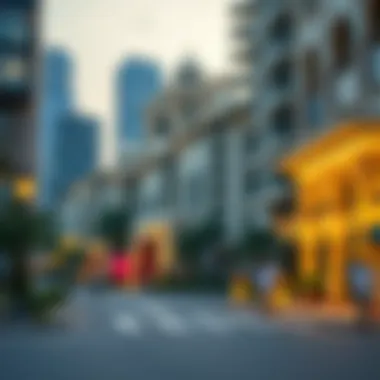

Moreover, apps promoting local Iftar options show menus and timings, allowing users to plan their meals ahead of time. This makes organizing whether dining out or ordering in much simpler. On top of that, community-driven platforms encourage users to share experiences or recipes during the month. Social features create a sense of togetherness, enabling people to celebrate even when distanced from loved ones. Here’s a snapshot of some popular Ramadan-focused apps:
- Ramadan Legacy - Personalizes the home experience, offering challenges and rewards for family engagement.
- Quranly - Tailored reading plans help increase Quran recitation.
- Iftar and Suhoor Apps - Help locals discover special menus or events hosted by restaurants.
These applications play a crucial role not just in individualize observance but also in fostering community ties, making the heartfelt traditions more accessible and engaging, especially for busy residents and expatriates.
Digital Events
As everything began to go online, so too did the spirit of Ramadan. With a mix of virtual gatherings and livestreamed events on platforms like Facebook and Zoom, Dubai has shown incredible adaptability. For example, mosques and cultural centers regularly host online Tafsir sessions, allowing people to learn about Islamic teachings from their homes. No more rushing to a venue; people can now share this experience globally.
Key events, often tied to charitable efforts, can be broadcast digitally as well. Fundraising has become seamless. With a tap or two, people can donate to organizations that provide meals for those in need. This digital transformation is practical but also refreshingly inclusive, pulling in more participants than ever before across varying platforms.
- Webinars on Islamic heritage - Allow attendees to broaden their understanding of the month’s deeper significance.
- Online cooking classes - Enable people to learn how to prepare Iftar dishes, connecting culinary traditions with fellowship.
- Prayer challenges and reflections - are shared, promoting spiritual growth through technology.
"In a time where personal connections are tested, technology bridges gaps and fosters understanding, especially in such a meaningful period as Ramadan."
In summary, Dubai's embrace of technology during Ramadan offers rich and diverse opportunities. From mobile applications that facilitate easier observance of faith to digital events that enable community engagement, the holy month's fabric interwoven with tech fosters a deeper connection to traditions while facing the unique challenges that this time of year presents.
Sustainability Practices in Ramadan
Ramadan, a month of reflection and community, also aligns with the global push for sustainability. In Dubai, this period emphasizes eco-conscious practices, woven into the fabric of local customs and economic activities. Embracing sustainability during this holy month not only demonstrates environmental responsibility but also enhances community bonds. Stakeholders across various sectors, from hospitality to real estate, find a unique opportunity to marry tradition with modern ecological values.
One key aspect of sustainability in Dubai during Ramadan is the emphasis on reducing waste. Waste Management Initiatives play a pivotal role in ensuring that the celebrations don’t come at the cost of the environment. The act of fasting, which naturally minimizes consumption during daylight hours, turns into a collective effort to curb excessive waste. Restaurants and hotels are stepping up with strategies to minimize food waste linked to Iftar and Suhour meals. Here's how:
- Many establishments now offer smaller portion sizes, allowing diners to enjoy a variety of dishes without over-indulging.
- Leftover food is often collected and distributed to those in need, ensuring that nothing goes to waste.
- Partnerships with organizations like Emirates Red Crescent, which facilitate food distribution, are becoming more common, ensuring that surplus meals benefit those less fortunate.
"Sustainability is not just a trend, but a way of life, especially during Ramadan when community spirit and generosity are at peak levels."
Furthermore, Eco-Friendly Events are gaining popularity, showcasing Dubai’s commitment to a sustainable future. These events focus on local traditions while minimizing environmental impact.
- Markets during Ramadan sometimes prioritize local, organic produce, reducing carbon footprints associated with transportation.
- Festivals promoting eco-friendly crafts and recycling initiatives educate attendees about sustainability, celebrating creativity while respecting the planet.
- Many of these events also look to involve local artisans, empowering the community and emphasizing the importance of supporting local economies.
The integration of sustainability practices during Ramadan reflects a broader understanding of environmental stewardship. As the month unfurls with its rituals and gatherings, the commitment to reducing ecological impact enriches the spirit of giving.
Gastronomic Trends During the Holy Month
During Ramadan, the culinary landscape in Dubai morphs into a vibrant tapestry, showcasing the rich flavors and traditions that define this holy month. Food plays a pivotal role in Ramadan, serving as more than mere sustenance; it's about community, sharing, and honoring traditions. The significance of gastronomic trends during this period is profound, influencing how residents and visitors partake in the essence of Ramadan.
Traditional Dishes
In Dubai, traditional Ramadan dishes surface as a cornerstone of Iftar—the meal that breaks the fast after sunset. Families and friends gather around tables filled with mouthwatering delicacies that resonate with cultural heritage. Popular traditional dishes include:
- Dates: Often the first food to break the fast, dates are celebrated not only for their sweetness but also for their nutritional benefits. They provide an immediate energy boost.
- Harees: A dish made from wheat and meat, slow-cooked to achieve a creamy texture. Harees is a staple during Ramadan, often served with sweet or salty variations, depending on personal preference.
- Samboosa: These savory pastries, filled with meat or vegetables, are fried to a golden crispness. They're a favorite appetizer, cherished for their addictively crunchy texture and versatility.
- Qamar Al-Din: A traditional apricot juice often served during iftar, this drink symbolizes the breaking of the fast and is favored for its refreshing taste.
Each of these dishes tells a story—of families, of shared experiences, and of the deep-rooted traditions that have endured over centuries.
Modern Culinary Innovations
In contrast to the traditional, modern culinary innovations have also made their mark during Ramadan in Dubai. Chefs and restaurants seize the opportunity to experiment with flavors and presentation. This creative flair not only honors tradition but also appeals to a diverse palate. Some standout innovations include:
- Fusion Cuisine: Middle Eastern dishes infused with global influences. For instance, sushi samboosa—tiny pastries stuffed with sushi ingredients—marries Oriental flavors with traditional pastries.
- Plant-Based Options: With a growing focus on health and sustainability, many eateries now offer innovative vegan and vegetarian Ramadan menus. High-protein alternatives like lentil kebabs are gaining attention.
- Gourmet Iftar Buffets: High-end hotels and restaurants in Dubai have taken the buffet experience to new heights. Luxurious spreads featuring everything from Mediterranean mezze to Asian-inspired noodle stations entice diners.
- Health-Conscious Offerings: Options that cater to diners mindful of their health, such as gluten-free, low-sugar, or organic dishes, allow patrons to enjoy festive meals without compromising their dietary needs.
As the city becomes a culinary melting pot during this month, the blend of tradition and innovation reflects the wider cultural dynamism of Dubai. The gastronomic trends during Ramadan serve as a reminder that while the essence of this holy month remains unchanged, there is always room for creativity and adaptation.
"Ramadan is not just about fasting; it’s about coming together through food and shared experiences, whether through traditional dishes or modern culinary creations."
The juxtaposition of traditional favorites and novel innovations provides a richer experience, catering to both locals and newcomers who revel in Dubai's dynamic food scene during Ramadan.
Insights from Experts
Understanding Dubai's atmosphere during Ramadan is crucial for investors, homebuyers, agents, analysts, and managers, as it reveals the interplay of tradition and modern practice. Insights from experts provide a nuanced understanding of market dynamics and cultural transitions that ensue during this holy month.
Real estate analysts, for instance, possess a wealth of knowledge about shifting trends. They observe how Muslims often prefer living in areas that embrace an active community spirit over the month of fasting. As such, they can pinpoint which neighborhoods experience increased demand, thanks to communal Iftar dinners and mosques hosting nightly prayers. This pattern becomes a focal point for real estate decisions, guiding investors toward properties that will remain desirable throughout Ramadan.
Furthermore, the engagement of cultural observers cannot be overlooked. They analyze how local traditions influence consumer behavior, adjusting marketing strategies accordingly. From the promotion of Iftar buffets in high-end hotels to community events celebrating the holy month, these findings can dictate where businesses should invest their resources. For example, hotels that offer tailored packages during Ramadan often see an uptick in bookings from tourists seeking to experience local culture, demonstrating how business strategies must pivot to meet the unique demands of the season.
"Insights from experts not only illuminate trends but also bridge the gap between cultural significance and business opportunities."
In addition, psychological insights can shed light on consumer spending habits during Ramadan. People often focus on generous acts, leading to increased charitable activities and community engagement. Experts note that businesses tapping into this goodwill—be it through charitable partnerships or community-oriented marketing—often find a favorable reception among consumers, strengthening brand loyalty.
Ultimately, insights from both real estate analysts and cultural observers provide a holistic view of Dubai's dynamic environmnet during Ramadan. The synergy of data on market trends and cultural practices arms stakeholders with vital information for making informed decisions. Through careful consideration of the insights shared by these experts, investors can strategically align their investments with the evolving sentiment and evolving market conditions during this significant time.








